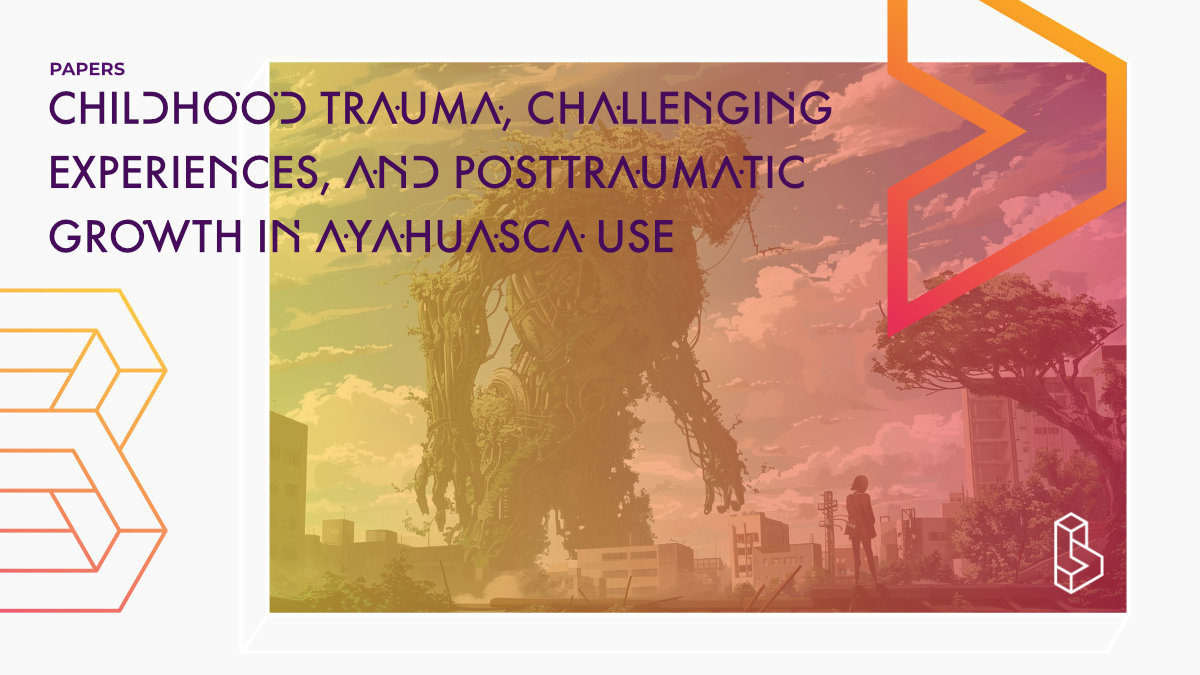This survey study (n=231) examines the relationship between childhood trauma, challenging experiences during acute ayahuasca effects, and posttraumatic growth. Results show that individuals with histories of childhood trauma were not at higher risk of adverse experiences during ayahuasca use, nor did they exhibit different levels of posttraumatic growth compared to those without such histories. Additionally, experiencing more challenges during acute ayahuasca effects did not correlate with increased posttraumatic growth.
Abstract of Childhood trauma, challenging experiences, and posttraumatic growth in ayahuasca use
“Challenging experiences in ayahuasca use, childhood trauma, and posttraumatic growth have not been investigated systematically. This study aimed to explore whether a self-reported history of childhood trauma was associated with challenging experiences during acute ayahuasca effects and whether such challenging experiences were associated with beneficial long-term outcomes measured by posttraumatic growth. For this study, 231 individuals (mean age 40.29, 48% women) completed an online survey about traumatic experiences in childhood, challenges during acute ayahuasca effects, and perceived benefits of those challenges. This study found that people with histories of childhood trauma were not at greater risk of adverse or challenging experiences during acute ayahuasca effects than people without histories of childhood trauma ( r = .080, p = .281, 95% CI [–.066, .223]). Additionally, there was no difference in posttraumatic growth among those who had history of childhood trauma versus those who did not ( r = –.016, p = .837, 95% CI [–.166, .135]). People who have experienced more challenges during acute ayahuasca effects did not experience more ayahuasca-related posttraumatic growth ( r = .137, p = .076, 95% CI [–.014, .281]). These findings are important, as they may indicate that childhood trauma exposure does not pose the same risk for a poor treatment response to ayahuasca, as it predicts in other forms of intervention.”
Authors: Ksenia Cassidy, Cj Healy, Eva Henje & Wendy D’Andrea
Summary of Childhood trauma, challenging experiences, and posttraumatic growth in ayahuasca use
Introduction
Ayahuasca, a plant-based psychedelic compound traditionally used in ceremonial settings by indigenous and mestizo peoples in the Amazon basin, has become more popular in the West in recent years. However, challenging experiences, including physical and psychological symptoms, commonly occur during and following ayahuasca experiences.
Prior life adversity may be related to different psychedelic trajectories, with attachment insecurity being associated with enhanced effects and enhanced risks of adverse outcomes. Attachment anxiety may contribute to increased readiness to drug effects, while attachment avoidance may contribute to increased benefit from psychedelic-induced experiences.
Find this paper
Childhood trauma, challenging experiences, and posttraumatic growth in ayahuasca use
http://dx.doi.org/10.1177/20503245241238316
Open Access | Google Scholar | Backup | 🕊
Cite this paper (APA)
Cassidy, K., Healy, C. J., Henje, E., & D’Andrea, W. (2024). Childhood trauma, challenging experiences, and posttraumatic growth in ayahuasca use. Drug Science, Policy and Law, 10, 20503245241238316.

